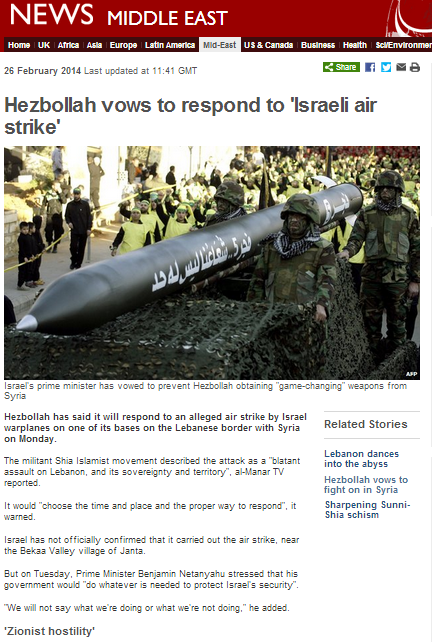On February 26th an article titled “Hezbollah vows to respond to ‘Israeli air strike’” appeared on the Middle East page of the BBC News website. 
Let’s take a look at how the BBC chooses to present the international terrorist and criminal organization Hizballah to its audiences.
The article begins with the standard euphemistic portrayal of a terrorist organization designated by numerous countries as a “militant movement”.
“Hezbollah has said it will respond to an alleged air strike by Israel warplanes on one of its bases on the Lebanese border with Syria on Monday.
The militant Shia Islamist movement described the attack as a “blatant assault on Lebanon, and its sovereignty and territory”, al-Manar TV reported.” [emphasis added]
Al Manar is of course a Hizballah run channel, but the article fails to make that point clear. The BBC also once again misleads audiences by promoting the myth that the terror organization has a separate “military wing”, even though Hizballah itself denies that such a separation exists.
“Hezbollah’s statement said the air strike caused material damage, but denied that it targeted any artillery or rocket positions or caused any casualties. Local reports had said four members of its military wing, the Islamic Resistance, were killed.” [emphasis added]
The BBC also fails to inform audiences of the redundancy of the propaganda moniker “resistance” and its political meanings.
“The attack confirms the nature of the Zionist hostility and requires frank and clear position from all,” Hezbollah added. “The Resistance will choose the time and place and the proper way to respond to it.” [emphasis added]
Once again, no mention is made of the fact that Hizballah is supplied, funded and supported by Iran or of the particularly relevant fact that under the terms of UN Security Council resolution 1701 (like its predecessors, 1559, 1608 and the Taif Accords), militias and terrorist organisations in Lebanon should have long since been disarmed and the sale or supply of weapons to such groups stopped.
The article concludes:
“Israel and Hezbollah fought a war in 2006, during which Israeli warplanes bombed Hezbollah strongholds in southern Lebanon and in Beirut, while Hezbollah fired about 4,000 rockets at Israel.
More than 1,125 Lebanese, most of them civilians, died during the 34-day conflict, as well as 119 Israeli soldiers and 45 civilians.”
Readers are not informed that the 2006 war began as a result of a cross-border raid carried out by Hizballah in Israeli territory or that missile attacks by Hizballah preceded Israeli air-strikes. Notably, Hizballah’s missile attacks are described as having been directed “at Israel” rather than at Israeli civilians in towns, cities and villages across northern Israel. The BBC claims that the war’s Lebanese casualties were mostly civilians but does not inform audiences that Lebanese figures do not differentiate between civilians and combatants, that Lebanese officials reported even before the conflict was over that some 500 of the dead were Hizballah fighters, that UN officials gave similar figures and that Israeli estimates stand at around 600 – more than half (and therefore “most”) of the total Lebanese casualty figures.
At the bottom of the article a link is provided to the BBC’s profile of Hizballah dating from December 4th 2013. As has been noted here previously, that profile replaced another one dating from July 2013 and the newer version heavily airbrushes Hizballah’s terrorist designation by numerous countries worldwide, its terrorist activities outside Lebanon, its involvement in the murder of Rafik Hariri and its role in the Syrian civil war. No mention is made whatsoever of Hizballah’s criminal activities around the globe.
There is, of course, nothing new in this article’s tepid representation of Hizballah. Regular readers will be only too aware that the policy of downplaying Hizballah’s terrorist designation, its close connections with Iran, its terrorist and criminal activities and its role in the Syrian civil war are par for the course.
Whatever the reasons behind that policy, it cannot be seen as an appropriate for an organization obliged under the terms of its constitutional basis to provide its audiences with ” a global understanding of international issues”.
Related Articles:
BBC’s Jim Muir whitewashes Hizballah violations of 1701
BBC trumpets Hizballah narrative of ‘resistance’




